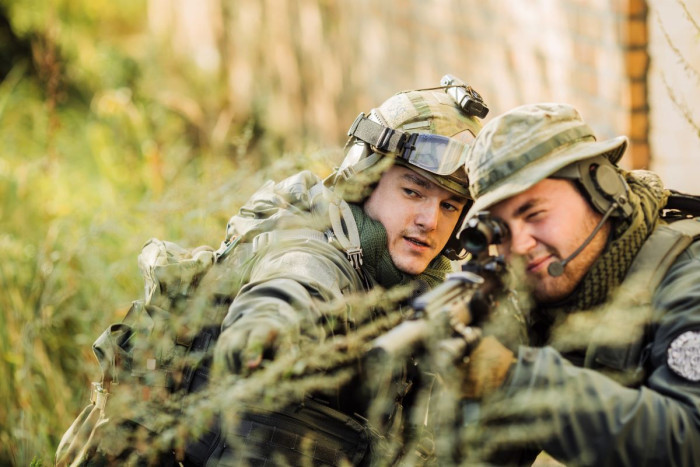Army Officer
Āpiha Ope Tauā
Alternative titles for this job
Army officers train army soldiers, manage field exercises and lead soldiers in combat, security operations, peacekeeping missions and disaster relief.
Pay
Army officers usually earn
$85K-$147K per year
Army officers can earn
$66K-$194K per year
Source: TEC research
Job opportunities
Pay
Pay for army officers varies depending on specialist trade, experience and rank.
- Army officers usually earn between $85,000 and $147,000.
- Army officers can earn between $66,000 and $194,000.
Army officers may also get food and accommodation allowances, free medical and dental care.
Source: TEC research.
(This information is a guide only. Find out more about the sources of our pay information)
What you will do
Army officers may do some or all of the following:
- organise and conduct training
- lead troops on deployment and instruct troops during training exercises
- budget, and manage resources assigned to them
- operate and maintain army equipment
- help in search and rescue operations, and disaster relief efforts in New Zealand and overseas
- conduct operational and strategic planning.
Army officers also have duties related to their area of specialisation. For example, engineering officers oversee the erection of bridges, and construction and maintenance of roads.
Skills and knowledge
Army officers need to have:
- leadership, management and budgeting skills
- problem solving and decision making skills
- knowledge of army regulations, tactics and protocol, including health and safety, ethics, and conduct
- knowledge of drills and parade requirements
- knowledge of how to operate and maintain weapons, radio, vehicles and specialist equipment
- first aid and rescue skills.
Army officers also need to have skills and knowledge related to their field of specialisation, or trade. For example, medical officers need knowledge of emergency care, nursing and surgical methods.
Working conditions
Army officers:
- usually work regular business hours but may be expected to work long or irregular hours on training exercises or when on deployment
- work and train at military camps in New Zealand and overseas
- work in all weather conditions and may have to work in combat situations
- may spend long periods away from home on overseas assignments.
Entry requirements
You need to do training to become an army officer.
You need:
- to be over 16.5 years old when you apply and over 18 when you finish your training
- to complete a training course
- a driver licence
- to pass a police check
- to pass a medical assessment.
Some trades differ in their age requirements, and may require you to have NCEA credits in specific subjects or a tertiary degree.
On-the-job training
New officer cadets are posted to Waiōuru Training Facility to complete the 12-month New Zealand Commissioning Course, and graduate as an officer in the New Zealand Army.
Once graduated, army officers will undergo further training in a specialist field of either combat, engineering, intelligence, communications/IT or logistics.
Secondary education
You usually don’t need specific NCEA levels for this job, but Level 2 may be useful. Useful subjects include English, maths, science, engineering, history, languages, physical education and technology subjects.
Personal requirements
Army officers need to be:
- disciplined and organised
- confident
- careful and accurate, with an eye for detail
- efficient and able to work well under pressure
- able to manage and lead people
- able to solve problems and make decisions
- able to give instructions and communicate well.
Useful experience
Useful experience for army officers includes:
- training as a soldier in the Territorial Force/Army Reserve
- involvement in youth organisations such as Scouts and Cadets
- work or sporting experience in a team environment
- work, sporting or other group experience in leading or managing others
- tertiary education, or experience of activities requiring self-discipline and responsibility.
Physical requirements
Army officers need to be able to pass Army fitness tests, so they should be fit, healthy and strong, with good hearing and eyesight (with or without corrective lenses). Some specialisations require you to have normal colour perception.
Find out more about training
- Defence Careers
- 0800 136 723 - www.defencecareers.mil.nz
What are the chances of getting a job?
Chances of becoming an army officer are average as the number of available positions has been reducing each year, causing high competition for vacancies.
There are around 700 officers in the New Zealand Army.
Diversity of staff important
The Army is committed to diversity, and is looking to increase the number of women and have more of a mix of cultures. Women typically make up about 15% of Army staff.
Chances good for cyber officers
The Army is looking to increase the number of intelligence officers and information technology specialists to boost New Zealand's cyber security.
Defence Force only employer
Army officers work for the New Zealand Defence Force in New Zealand and overseas.
Sources
- Army News, 'A Message from Chief of Army', February 2017, (www.army.mil.nz).
- Defence Careers website, 'Army Intake Schedule', accessed July 2017, (www.defencecareers.mil.nz).
- New Zealand Defence Force, 'Defence White Paper 2016', June 2016, (www.defencecareers.mil.nz).
- New Zealand Defence Force, 'Future35 Our Strategy to 2035', accessed July 2017, (www.nzdf.mil.nz).
- New Zealand Defence Force, 'New Zealand Government Defence Capability Plan 2016', (www.nzdf.mil.nz).
- New Zealand Defence Force, 'The 2015-2016 Annual Report', accessed July 2017, (www.nzdf.mil.nz).
- Patterson, J, 'NZ Defence Force to get $20bn Upgrade', 8 June 2016, (www.radio.co.nz).
(This information is a guide only. Find out more about the sources of our job opportunities information)
Progression and specialisations
Army officers may progress in rank to:
- second lieutenant
- lieutenant
- captain
- major
- lieutenant colonel
- colonel
- brigadier general
- major gneral
- lieutenant general (chief of defence force).
Army officers may specialise in:
- combat
- engineering
- intelligence
- communications
- logistics
- health.
Last updated 8 October 2024


